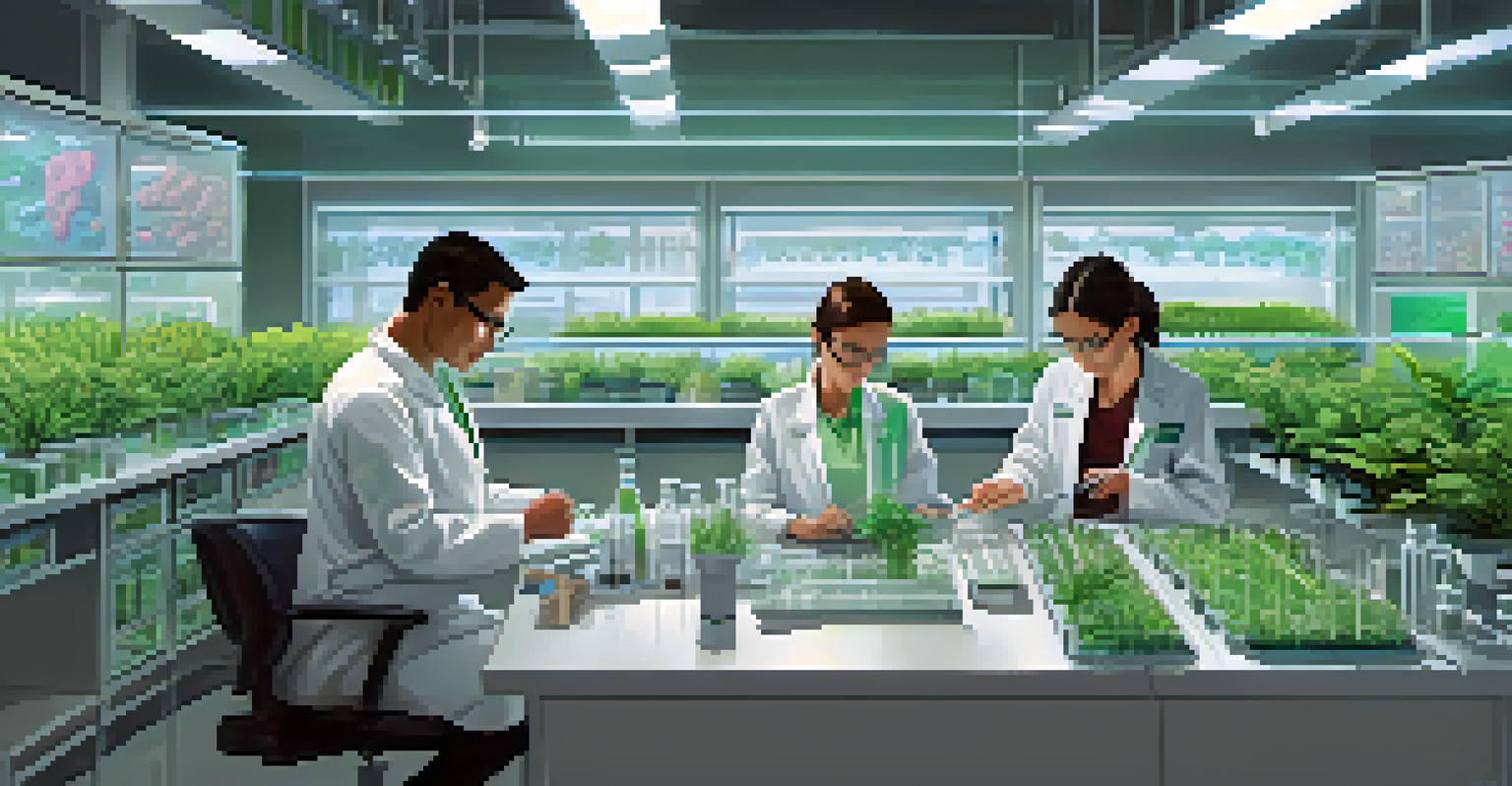Genetic Engineering: Shaping the Future of Food Plants

Understanding Genetic Engineering in Agriculture
Genetic engineering is a scientific technique that alters the DNA of organisms, including food plants. By modifying specific genes, scientists can enhance desirable traits, such as pest resistance or nutritional value. This process is often compared to traditional breeding, but it allows for much more precision and speed in achieving desired outcomes.
The greatest danger in times of turbulence is not the turbulence; it is to act with yesterday's logic.
For example, a common application of genetic engineering is the creation of Bt corn. This corn has been modified to produce a protein from the Bacillus thuringiensis bacterium, which naturally protects it from certain pests. As a result, farmers can reduce their reliance on chemical pesticides, benefiting both the environment and their bottom line.
However, genetic engineering is not without controversy. Concerns about safety, ethics, and environmental impact often spark debates among scientists, policymakers, and the public. Understanding the science behind genetic engineering is crucial to making informed decisions about its role in food production.
Benefits of Genetic Engineering for Food Plants
One of the most significant advantages of genetic engineering is increased crop yields. By developing plants that can withstand harsh conditions, such as drought or extreme temperatures, farmers can produce more food with fewer resources. This is especially important as the global population continues to grow, putting pressure on food supplies.

Another benefit is the enhancement of nutritional content in food plants. For instance, Golden Rice has been engineered to contain higher levels of vitamin A, addressing deficiencies in populations that rely heavily on rice as a staple food. Such innovations can play a vital role in combating malnutrition worldwide.
Genetic Engineering Boosts Yields
By creating crops that can withstand harsh conditions, genetic engineering significantly increases food production efficiency.
Moreover, genetic engineering can help reduce agricultural waste. By creating plants that have a longer shelf life or are resistant to bruising, farmers and retailers can minimize losses and deliver fresher products to consumers. This not only supports food security but also contributes to sustainability efforts.
Challenges in the Adoption of Genetic Engineering
Despite the benefits, the adoption of genetically engineered food plants faces several challenges. One major hurdle is public perception; many consumers are wary of genetically modified organisms (GMOs) due to safety concerns and a lack of understanding. This skepticism can influence market demand and policy decisions.
Science knows no country, because knowledge belongs to humanity, and is the torch which illuminates the world.
Furthermore, regulatory hurdles can slow down the development and approval of new genetically engineered crops. Each new variety must undergo extensive testing to ensure safety and efficacy, which can take years and require significant investment. This lengthy process can deter innovation and delay the introduction of potentially beneficial crops.
Additionally, there is an ongoing debate about the long-term environmental effects of genetically engineered plants. Some worry that crossbreeding with wild relatives could disrupt ecosystems, leading to unforeseen consequences. Balancing innovation with environmental stewardship is essential for the future of agriculture.
The Role of Genetic Engineering in Climate Change Resilience
As climate change poses increasing threats to agriculture, genetic engineering offers potential solutions to enhance resilience. By developing crop varieties that can thrive in changing climates, scientists aim to secure food production for future generations. For instance, researchers are working on drought-resistant crops that can survive with less water, which is crucial in arid regions.
Additionally, genetic engineering can help plants adapt to pests and diseases that may emerge as temperatures rise. By equipping crops with enhanced resistance traits, farmers can protect their harvests without relying as heavily on chemical treatments. This not only reduces costs but also minimizes environmental impact.
Addressing Ethical Concerns
The discussion around genetic engineering must include ethical implications, such as monopolization of food production and consumer rights.
Ultimately, the integration of genetic engineering into climate adaptation strategies could play a pivotal role in ensuring food security in a rapidly changing world. As we explore these advancements, it's essential to continue fostering dialogue about their implications for society and the environment.
Ethical Considerations in Genetic Engineering
Ethical considerations are paramount in the discussion of genetic engineering in food plants. Questions about the morality of altering the genetic makeup of living organisms often arise, prompting debates about the limits of scientific intervention. It's essential to examine these ethical implications to ensure responsible use of this powerful technology.
One key concern is the potential for monopolization of food production by large biotech companies. As patents on genetically engineered crops become more common, smaller farmers may struggle to compete, leading to a concentration of power in the agricultural sector. This raises questions about food sovereignty and the rights of farmers.
Moreover, transparency and labeling are essential for consumer choice. Many advocates argue that consumers have the right to know whether their food contains genetically modified ingredients. By fostering open discussions about genetic engineering, we can work towards ethical frameworks that support innovation while respecting individual rights and preferences.
Future Innovations in Genetic Engineering for Food Plants
The future of genetic engineering in food plants is promising, with ongoing research paving the way for groundbreaking innovations. Techniques like CRISPR-Cas9 have revolutionized the field by allowing for precise edits to DNA, making it easier to develop new traits. This advancement opens doors for creating crops that not only meet current needs but also anticipate future challenges.
One exciting direction is the development of plants that can improve soil health. Researchers are exploring ways to engineer crops that can enhance nutrient cycling or promote beneficial microbial activity in the soil. Such innovations could lead to more sustainable farming practices and improved ecosystem health.
Climate Resilience Through Innovation
Genetic engineering offers solutions to enhance crop resilience against climate change, ensuring food security for future generations.
As we look ahead, collaboration between scientists, farmers, and policymakers will be crucial. By working together, we can harness the potential of genetic engineering to create a resilient and sustainable food system that benefits everyone.
Conclusion: Embracing the Potential of Genetic Engineering
In conclusion, genetic engineering holds significant promise for shaping the future of food plants. By addressing challenges such as climate change, food security, and nutritional deficiencies, this technology can play a vital role in feeding a growing population. However, it is essential to navigate the associated ethical, environmental, and social concerns carefully.
As we embrace the potential of genetic engineering, fostering open dialogue and collaboration will be key. Engaging consumers, farmers, and scientists in discussions about these innovations can help build trust and understanding, ensuring that the benefits are shared equitably.

Ultimately, the success of genetic engineering in agriculture will depend not only on scientific advancements but also on our collective commitment to responsible stewardship of our food systems. By working together, we can harness this technology to create a healthier, more sustainable future.